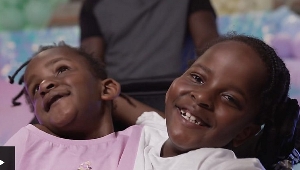A dad who struggles to dress his conjoined twin daughters has welcomed calls to make mainstream fashion more accessible.
Seven-year-olds Marieme and Ndeye share many things, but not the same sense of style.
So staff and students at the University of South Wales' fashion department are creating bespoke designs just for them.
Now the team of designers are helping them express their individuality and feel more comfortable in their clothes.
"When I first heard about the girls I thought what an amazing project to be involved in," said Susan James, a technical instructor in fashion at the university, which offers modules adaptively.
"To give them something they can't normally get - to be able to go into a store and that excitement and everything that brings with it."
The girls are joined at the pelvis, sharing one pair of legs. Ndeye has a left arm and Marieme a right, and they share use of a middle arm. Their father Ibrahima struggles to dress them.
"It is giving me grey hairs every day," he joked. "You have to buy two identical tops to join them together.
"They have two legs, so they can have regular trousers, but their hips are very wide so you have to take it to the alteration shop."
Although the girls are conjoined, they have different taste in clothes.
Ndeye likes pink. Marieme likes red. Ndeye would like a unicorn motif. Marieme is obsessed with cats.
The girls are thriving, but still face many challenges and are dependent on each other to live. Ndeye's system works hard to help support Marieme, which makes her hotter and sweat more than her sister.
Now the fashion department has joined a t-shirt for Ndeye with a sweatshirt for Marieme, and adapted a winter coat with less thermal padding for Ndeye and more for Marieme.
The girls' bodies and needs are unique. But there are calls for more wearable fashion for all disabled people.
Africa News of Wednesday, 21 February 2024
Source: bbc.com













